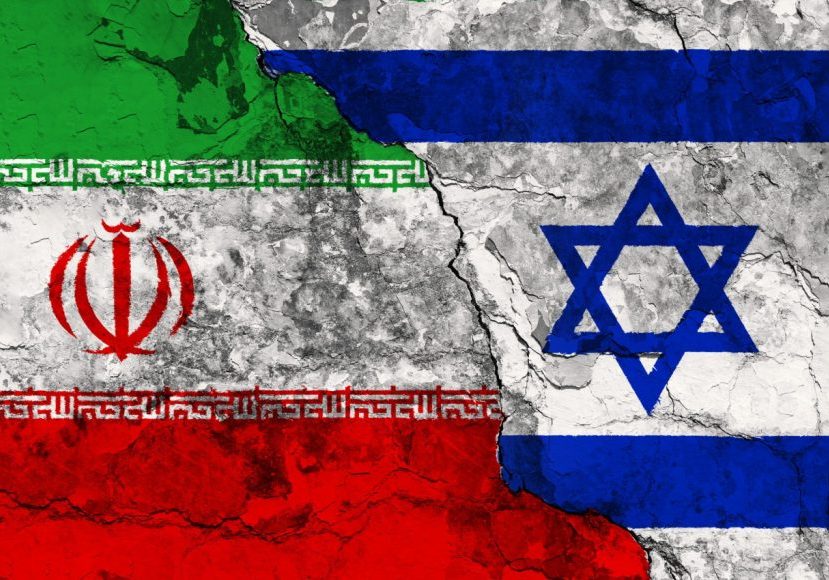Australia/Israel Review
The Biblio File: The Usual Suspect
Nov 1, 2007 | Jeffery Goldberg
 |
“The Israel Lobby and US Foreign Policy”, by John Mearsheimer and Stephen Walt, Farrar, Strauss & Giroux, US$26
By Jeffery Goldberg
In October 2002, Osama bin Laden issued a statement in which he analysed America’s inexhaustible number of sins and prescribed ways of repenting for many of them. The statement was, by the standards of bin Laden’s cave encyclicals, unusually coherent. (Unlike, say, his most recent video, released in early September, which ranged across the sub-prime mortgage crisis, America’s high rate of taxation, and the work of Noam Chomsky – the latter treated sympathetically, of course.)
Bin Laden asked Americans to submit to Islam, which he called “the religion of showing kindness to others.” He excoriated them for their immorality: “We call you to be a people of manners, principles, honour and purity; to reject the immoral acts of fornication, homosexuality, intoxicants [and] gambling.” He condemned Americans for AIDS, which is a “Satanic American invention”. He also declared himself in opposition to the pervasive practice of incest in America. He concluded that “it is saddening to tell you that you are the worst civilisation witnessed by the history of mankind.” They are the worst because they “invent” their own laws to govern themselves, rather than embrace God’s law, or more precisely, his God’s law, Sharia; and because they mandate the separation of religion from politics; and because they allow usury.
The American addiction to usury is most upsetting to bin Laden. And he has a theory about its historical origins: Western banking is Jewish banking. “As a result of [usury], in all their different forms and guises, the Jews have taken control of your economy, through which they have then taken control of your media, and now control all aspects of your life, making you their servants and achieving their aims at your expense.”
The Jews, of course, are a preoccupation of bin Laden’s. They are an important source of immorality, and, in their union with Christianity – the “Zionist-Crusader alliance” of which he often speaks – they have for centuries propagated falsehood and heresy.
In the 2002 letter, bin Laden blames America for providing support to the usurping Zionists, but a careful reading of his rant will show that American support for Israel is only one of his many grievances against America. “You attacked us in Somalia; you supported the Russian atrocities against us in Chechnya, the Indian oppression against us in Kashmir,” he writes. “You steal our wealth and oil at paltry prices… This theft is indeed the biggest theft ever witnessed by mankind in the history of the world… Your forces occupy our countries; you spread your military bases throughout them; you corrupt our lands.” The al-Qaeda worldview is a fevered jumble, in which hatred never lacks an object and infidels are infinite.
It is rather uncontroversial to call Osama bin Laden an antisemite. He is the easy case. But since many people in the West are queasy about attaching the label of antisemitism to almost anybody, let me begin by describing bin Laden’s view of history less inflammatorily – not as antisemitic, but as Judeocentric. He believes that Jews exercise disproportionate control over world affairs, and that world affairs may therefore be explained by reference to the Jews. A Judeocentric view of history is one that regards the Jews as the centre of the story, and therefore the key to it. Judeocentrism is a single-cause theory of history, and as such it is, almost by definition, a conspiracy theory. Moreover, Judeocentrism comes in positive forms and negative forms. The positive form of Judeocentrism is philosemitism, the negative form is antisemitism.
In the inflamed universe of negative Judeocentrism, there is a sliding scale of obsession. Mahmoud Ahmadinejad, the president of Iran, seems at times to view the world entirely through the prism of a Jewish conspiracy, and he regularly breaks new ground in the field of state-supported Holocaust denial. In Cairo, the activities of Jews, Israeli and otherwise, are a continual source of worry. Many of the monarchs in the Gulf countries, by contrast, will sometimes exploit anti-Jewish feeling for political reasons, but they do not seem to be personally obsessed by Jews. They are too worldly for that. In Europe, too, one finds great variations in the expression of Judeocentrism. There are still traces of Holocaust-induced philosemitism in places like Germany; but there are also figures such as Clare Short, the former British cabinet minister, who recently blamed Israel for global warming.
America, too, has a history of Judeocentrism, and also of the negative kind, the essence of which has been the belief that Jews, in order to advance their own interests, are responsible for entangling America in unnecessary wars. In the years leading up to World War II, the Jewish desire for war against Hitler was a constant theme of Father Coughlin, Charles Lindbergh, and Joseph P. Kennedy. Perhaps the best and most succinct expression of this school of American Judeocentrism was offered by Mel Gibson when he explained, upon his arrest for drunk driving, that “the Jews are responsible for all the wars in the world.”
It is an odious tradition, and I do not see how any thoughtful or decent individual would wish to belong to it. But the tradition has now found a couple of unexpected new tribunes. The Judeocentric understanding of America’s foreign policy is now the special province of two ostensibly reputable scholars, John J. Mearsheimer of the University of Chicago and Stephen M. Walt of Harvard University. The two men gained their fame last spring, after the publication of an article in the London Review of Books that condemned the activities of Jewish-American supporters of Israel and argued that those activities are responsible for an astounding number of world-historical developments.
In the article, the word “lobby” was ominously capitalised, Robert Ludlum style, as “the Lobby”. In their new book, which builds on (and worsens) that earlier work, Mearsheimer and Walt lower-case the word “lobby”, as a small tribute, I suppose, to the reality-based community. They have also excised some of the rougher language of their original blast. They have corrected some, though not all, of their errors of fact. But otherwise the book remains true to the malignant and dishonest spirit of the article.
The villains in The Israel Lobby and US Foreign Policy are almost entirely Jewish. Many of the chapters of the book contain extensive lists of Jews (even Rothschilds) who, the authors claim, act against the best interests of the United States. And act effectively: the Israel lobby in this book is an invincible juggernaut. In some of Mearsheimer and Walt’s pages, AIPAC resembles SMERSH or THRUSH. The America-Israel Public Affairs Committee, you see, “has an almost unchallenged hold on Congress,” and therefore on the United States. (In the London Review article, the “hold” was described as a “stranglehold”.)
And how do we know that AIPAC has a hold on Congress? This is a very good question. For Mearsheimer and Walt are so thoroughly under the spell of their own assertions that they do not seem to notice the circular quality of what they have written. Consider a typical sentence: “The real reason why American politicians are so deferential [to Israel] is the political power of the Israel lobby.” That is not a proof. That is what requires a proof.
 |
| Walt and Mearsheimer find the many reasons for US sympathy for Israel “unfathomable” |
So what are Mearsheimer and Walt’s methods? A hasty survey of a vast literature on Israel and the Middle East, clearly unfamiliar to them until very recently, so as to cite every and any remark that suits their purpose, its context or its veracity notwithstanding. Most significantly, and by their own admission, Mearsheimer and Walt did no reporting. They did not interview a single member of Congress for their book about Congress. Perhaps it is beneath them as scholars to behave like journalists. But their methodological arrogance, their failure to meet any serious standard of empirical inquiry, their slavish reliance on second- and third-hand works, is astonishing. At an appearance in September at the bookstore “Politics and Prose”, in Washington, Walt confidently asserted that “I think if we had interviewed every member of Congress and every lobbyist at AIPAC we would not have found a substantially different story than the one we reported.” How does he know?
After baldly declaring, in the manner of conspiracy theorists, and over and over again, also in the manner of conspiracy theorists, that AIPAC dominates Congress (at the same time claiming, risibly, that “we do not believe the lobby… controls important institutions in the United States”), Mearsheimer and Walt then proceed to catalogue all the mistakes and the crimes for which AIPAC and the many other groups that make up the pro-Israel lobby are, in their omnipotence, responsible.
Mearsheimer and Walt are not alleging the existence of a secret Jewish plot to control American foreign policy; they are alleging the existence of an open Jewish plot to control American foreign policy.
The unmistakeable message of The Israel Lobby and US Foreign Policy is that the destruction on Sept. 11 was caused in significant measure by the Jews. “The United States has a terrorism problem in good part because it has long been so supportive of Israel,” Mearsheimer and Walt write. “Many people may not realise how much America’s one-sided policies have cost it over the years. Not only have these policies helped inspire al-Qaeda, but they have also facilitated its recruitment efforts and contributed to growing anti-Americanism throughout the region.” At “Politics and Prose”, Walt went on to say that “American policy gives some individuals in the Arab and Islamic world cause to attack the United States as happened on 9/11.” Cause! Ponder that word.
Al-Qaeda’s war on America is only one of three wars that Mearsheimer and Walt blame on Israel and its mainly Jewish supporters. They argue that pro-Israel Jews in America were “the principal driving force behind the Bush administration’s decision to invade Iraq in 2003”; and they argue that it is only Jewish organisations, and their patrons in the Jewish state, that are now fomenting a war against Iran.
To support their preference for an American-Iranian détente, Mearsheimer and Walt present a spectacularly partial rendering of the pertinent history – they do not even consider that one barrier to better relations with the theocratic dictators in Teheran might be our inconvenient but painful memories of the hostage crisis. And in making their case that it is only Jews who oppose reconciliation with Iran, they neglect to mention, among other things, European opposition to the Iranian nuclear program. Their Judeocentric interpretation of the Iran hawks does not consider the possibility that Nicolas Sarkozy, the president of France, might have been motivated only by French national security interests when he recently said that Iran’s obstinacy on the nuclear question would have “catastrophic consequences”.
Mearsheimer and Walt stretch their Iran argument to the snapping point. They contend that Israeli politicians and their supporters in America exaggerate the existential threat to Israel posed by Iran, because Iranian radicals have not actually called for the elimination of Israel. They assert that “Ahmadinejad’s call for Israel to vanish from the page of time’ (or to be erased from the pages of history’) is often mistranslated as a call for Israel’s physical destruction (i.e. ‘to wipe Israel off the map’).” Often mistranslated? I wonder how good their own Farsi is. But al-Jazeera – no known Jewish control there – reported in 2005 that at the “World Without Zionism” conference in Teheran, Ahmadinejad declared that “Israel must be wiped off the map.” Ahmadinejad’s own website described the speech this way: “He further expressed his firm belief that the new wave of confrontations generated in Palestine and the growing turmoil in the Islamic world would in no time wipe Israel away.” The official Iranian broadcast service reported that “Iran’s President… on Wednesday called for Israel to be wiped off the map.” Surely there are clearer ways to express a desire for coexistence.
It is mystifying that Mearsheimer and Walt would so easily destroy their own credibility by stating as fact lies that are so easily refuted.
 |
| Professors Walt and Mearsheimer: Astonishingly unscholarly research |
The Israel Lobby and US Foreign Policy is a book of continuous astonishments. Each chapter contains assertions of Jewish misbehaviour, or criminality. The history of the Arab-Israeli conflict recounted here is comically one-sided, even by the standards of Israel’s revisionist historians. In Mearsheimer and Walt’s telling, Israel is perpetually the aggressor; it has never made a serious move toward peace and compromise; and its existence has never been threatened by the Arabs. I will not dwell here on their many mistakes and distortions, except to point out two of the most obvious ones: their claim that Israel’s Arab neighbours did not hope to destroy the Jewish state in 1967, and their claim that Israel, under the leadership of Ehud Barak, did not offer Yasser Arafat anything fair or interesting at Camp David and Taba in 2000/2001. Both are easily refuted. (An obscure little volume called My Life, by Bill Clinton, makes a quick hash of their account of the peace process.)
Not willing to undermine their portrait of the Palestinians as lambs before the Jewish wolf, Mearsheimer and Walt only fleetingly acknowledge the existence of Palestinian terrorism, except to observe that Palestinian terrorism was forced on the Palestinians by Israel’s unrelenting suppression after the 1967 war. “Not surprisingly, Palestinian resistance has frequently employed terrorism, which is usually how subject populations strike back at powerful occupiers.”
In building their case against Israel and its supporters in America, Mearsheimer and Walt prophylactically denounce antisemitism. But at the same time they argue that it barely exists, or that its existence has no bearing whatever upon this bitter discussion: “While the charge of antisemitism can be an effective smear tactic, it is usually groundless.” Usually when, and usually where? No, not all criticism of Israel or AIPAC is antisemitic. But the idea that no criticism of Israel or AIPAC is antisemitic is just as ridiculous. To proceed with their generalised and somewhat defensive point, Mearsheimer and Walt ignore an abundance of evidence about Europe, including the well-publicised British parliamentary report on antisemitism, issued in September 2006, which found anti-Jewish incitement in Britain to have reached crisis levels. The leader of that parliamentary inquiry, Denis MacShane, wrote in the Washington Post that “Europe is reawakening its old demons, but today there is a difference. The old anti-Semitism and anti-Zionism have morphed into something more dangerous.”
Not so, say Mearsheimer and Walt. They do not deny, though, that “there is antisemitism among European Muslims, some of it provoked by Israel’s behaviour toward the Palestinians and some of it straightforwardly racist.” This is a bizarre and foul passage, its foulness easily clarified by a simple act of substitution. Imagine Farrar, Straus and Giroux publishing the following sentence: “We would not deny that there is some racial prejudice among whites, some of it provoked by the misbehaviour of African-Americans, and some of it straightforwardly racist.”
The Israel Lobby and US Foreign Policy is premised on many such nasty and false ideas, but underpinning them all is the belief that America supports Israel only because the pro-Israel lobby forces it to do so. Mearsheimer and Walt contend – we have heard this contention many times before – that Israel has no strategic or moral value to America, and that a proper foreign policy would cut Israel adrift. What is unfathomable to them is that many Americans, Jewish and otherwise, admire Israel. Forty years of polling has consistently shown that Americans support Israel in its conflict with the Arabs. Why? There are a multitude of plausible reasons. Both Israel and America were founded by refugees from European religious intolerance; both are rooted in a common religious tradition; Israel is a lively democracy in a part of the world that lacks democracy; Israelis seem self-reliant in the manner of American pioneers; and Israel’s enemies, in many cases, seem to be America’s enemies as well. And perhaps some obstreperous Americans side with Israel simply because the radical Islamists demand that they stop.
None of these possible explanations has penetrated the minds of Mearsheimer and Walt. There is only one cause for America’s support for Israel, they say: the lobby, its money, its muscle, its effectiveness at suppressing dissent about its activities and about the depth of Israel’s crimes and strategic uselessness. The ultimate lesson of this book is that America must free itself from the shackles of the pro-Israel lobby. It is this message, more than any other, that makes Mearsheimer and Walt the heirs of a certain American current. In 1940, Joseph P. Kennedy went to Hollywood to address its mostly Jewish studio chiefs. As recounted in Neal Gabler’s An Empire of Their Own: How the Jews Invented Hollywood, Kennedy told his lunch audience to “stop making anti-Nazi pictures or using the film medium to promote or show sympathy to the cause of the democracies versus the dictators.” He told the executives that the Jews were already being blamed for the war. His bullying was effective: the studio chiefs, uneasy about their ethnic heritage and therefore susceptible to the call of assimilation, were frightened into compliance by his message, until America entered the war a year later. Mearsheimer and Walt have set themselves a similar goal: to convince non-Jews that their Jewish fellow citizens do not have their best interests at heart, and, further, to harass or to rattle or to embarrass American Jews into silence.
But wait. Isn’t AIPAC the one that is in the business of intimidation? “The lobby has gone to considerable lengths to shape public discourse about Israel by putting pressure on the media and academia and by establishing a tangible presence in influential foreign policy think tanks,” Mearsheimer and Walt insist. “Efforts to shape public perceptions often include charging critics of Israel with antisemitism.” The publication of their article in the London Review of Books certainly provoked controversy. It was designed to provoke controversy. But our heroes’ skin proved too thin for controversy. Though they were extensively praised in Europe, Mearsheimer and Walt experienced a good deal of withering criticism in America. (And also some fair, even generous coverage in America, including a credulous Washington Post Magazine cover story about their work.) And yet their ideas have been widely debated and discussed. And yet they received a dizzying advance to turn their essay into this book. And yet their book is already a best-seller.
They claim that they themselves are victims of the pro-Israel lobby, but the existence of their book, and the sensation that attends it, rather negates their self-pity. When I visited Amazon.com to check the book’s ranking a few weeks ago – it was at number 35 – I learned that customers who bought it also purchased The Power of Israel in the United States; Beyond Chutzpah: On the Misuse of Antisemitism and the Abuse of History; They Dare Speak Out: People and Institutions Confront Israel’s Lobby; and of course Jimmy Carter’s Palestine: Peace Not Apartheid. So there is a literature of this sort, and a market for it. And yet in their own minds – this is the comic dimension of this sad story – Mearsheimer and Walt are dissidents. They seem to think that anybody who disagrees with what they say is denying their right to say it.
There is an interesting book to be written about the power of AIPAC, and other pro-Israel lobbying groups, in Washington. I am not much of a believer in AIPAC.
I have three reasons for my distaste for AIPAC. The first is a matter of style: AIPAC’s leaders tend toward glibness and certitude, when the Middle East is a dense and ambiguous place. The second is that I dislike single-issue lobbies and single-issue politics. The third is that AIPAC has leaned rightward in recent years, and today seeks to drum up support for policies that do not seem to me to be in Israel’s best interests. On the issue of aid to Israel, AIPAC reflexively seeks from Congress generous grants that also do not seem to me to be in Israel’s best interests.
Now, none of these criticisms requires any courage on my part. Indeed, these opinions are all widely held and widely debated within the exceedingly unmonolithic Jewish community. Mearsheimer and Walt are for the two-state solution, which is banal but fine. Yet when did support for the two-state solution require support for a Jewish conspiracy theory? Why couldn’t these formerly credible scholars have made their criticisms of AIPAC and of Israel without demonising Jews and demonising Israel? And do they know anything, anything at all, about lobbies in the nation’s capital?
Of course AIPAC acts forcefully, even arrogantly: for lobbyists, that is one definition of professional success. Mearsheimer and Walt write about the lobbying activities of AIPAC and other Jewish lobbying and advocacy groups as if they had never set foot in the capital.
One of the most serious charges that Mearsheimer and Walt level at AIPAC and its neoconservative fellow travellers is that they were indispensable in pushing America to invade Iraq. There is no doubt that neoconservatives agitated for the war, and that many neoconservatives are Jews; and there is no doubt that there were Jews, in and out of the Bush Administration, who argued for the invasion of Iraq, including Paul Wolfowitz, Scooter Libby, Douglas Feith, and Richard Perle. There were also some Christians at the scene, including George W. Bush, Dick Cheney, Donald Rumsfeld, Condoleezza Rice, Colin Powell, Stephen Hadley, and Richard Myers. Some of those Christians were even in positions to order the invasion!
The assertion that the Iraq war would not have happened except for the lobbying of Jews is an echo of an ancient idea spread by anti-Jewish ideologues: that Jews, operating in the shadows, manipulate Gentile leaders to unknowingly advance Jewish interests. In order to believe this in the case of Iraq, the argument would have to be made that Bush, Cheney, and Rumsfeld were not merely idiots, but also uninterested in ruling. A couple of years ago I asked Rumsfeld to comment on accusations that the Jewish lobby manoeuvred the administration into war. “I suppose the implication of that is the President and the Vice President and myself and Colin Powell just fell off a turnip truck to take these jobs,” he said.
The Israel Lobby and US Foreign Policy further asserts that the Israeli government itself had been arguing vociferously for an American invasion of Iraq since 2001. Mearsheimer and Walt point to public-opinion polls that showed that, across the globe, only the civilian populations of Israel and Kuwait supported the war. They write as if mystified by these findings. It is worth noting that both Kuwait and Israel had been attacked by Saddam Hussein – Kuwait by his army, Israel by his missile force. Perhaps this explains the poll results. And yet the fact is that the Israelis, and the pro-Israel lobby, were focused mainly on the threat from Iran, not Iraq, during the first years of this decade. AIPAC supported the Administration in its pursuit of Saddam Hussein, but only after the invasion seemed to be a fait accompli.
In September, in an interview, Lawrence Wilkerson, Colin Powell’s Chief-of-Staff at the State Department, and an adversary of administration neo-conservatives, told me that Israel had been consistently warning the administration that Iran was the main threat, not Iraq. “The Israelis tried their best to persuade us that we were focused on the wrong enemy,” he said, “and that they were very leery of destroying the balance of power in the Middle East. But once they understood that we were going to war, come hell or high water, they weren’t going to get on the wrong side of the president of the United States.” (Wilkerson, of course, makes no appearance in this book.)
And yet even the charge that Jewish organisations took us to war in Iraq is not the low point in Mearsheimer and Walt’s book. Its most sinister accomplishment is surely the accusation that al-Qaeda attacked America because America supports the Jewish state. At Politics and Prose, Mearsheimer uttered this remarkable statement: “Osama bin Laden wanted very much to make sure that the attacks struck at Congress, which he saw – quite correctly – as the location of the critical support of the United States for Israel.” Mearsheimer seemed pleased, rather than appalled, that bin Laden’s analysis of Congress’s priorities squared so perfectly with his own.
Yes, bin Laden has Jews on the brain. But he also obsesses about much else. Don’t trust me on this; trust the (non-Jewish) experts. “You could take Israel out of the equation and al-Qaeda would still want to attack us,” Lawrence Wright, the author of The Looming Tower, told me. Richard Clarke, the al-Qaeda expert in the Clinton and Bush administrations, said that “if you look at al-Qaeda’s own writing and their public statements, Israel was not a major theme. What they say is pretty clear. They want to eliminate the presence of the ‘far enemy’ – us – from the Islamic world, because the far enemy props up the ‘near enemy’, the moderate Arab states… If Israel didn’t exist, they’d be doing the same thing.” And Peter Bergen, the al-Qaeda expert at the New America Foundation – one of just three Washington think tanks that Mearsheimer and Walt praise for escaping the control of the Israel lobby – told me that, while the Israel-Arab conflict provides strong recruitment, “Pakistan is the epicentre of planning and training, and the Kashmir conflict is the strong engine there.”
In their discussion of these matters, Mearsheimer and Walt seem not just mendacious but also shallow. Consider an example. After cherry-picking quotations from jihadists to support the view that America’s ties to Israel brought us the attacks of Sept. 11, they raise the subject of Sayyid Qutb’s anti-Americanism. Qutb was a terribly important Egyptian Islamist, and al-Qaeda’s main intellectual inspiration. Mearsheimer and Walt instruct that “Sayyid Qutb, the Egyptian dissident whose writings have been an important inspiration for contemporary Islamic fundamentalists, was hostile to the United States both because he saw it as a corrupt and licentious society and also because of US support for Israel.” But wait. Qutb was executed by the Egyptian government in 1966, almost a year before the Six Day War. It was not until after that war that America replaced France as Israel’s chief protector and arms-supplier. In fact, throughout the 1950s, the Eisenhower Administration was often quite hostile to Israel. So Qutb’s objection, then, was not to American support for Israel, but to American recognition of Israel. If this is the case, then Islamist anger at America predates our support for the usurping Zionists.
One would think that the editors at Farrar, Straus and Giroux might have harpooned this leviathan of a contradiction before it reached print. Unless of course you believe, as I do, that Farrar, Straus and Giroux has all along been allowing Mearsheimer and Walt to undermine their own credibility by promoting their abysmal arguments about Jewish power. The publishing house, you see, is not known to be a part of the Jewish lobby, but its owner, the German company Holtzbrinck, has been emphatically friendly to Israel, in part out of guilt that its founder was a Nazi. Remember, everything is not what it seems. This book about a malevolent conspiracy may itself be the work of a benevolent conspiracy. I mean, who really benefits from making anti-Zionism and antisemitism seem so indefensible? Come to think of it, the name Mearsheimer does have a bit of a Jewish ring.
![]()
Jeffrey Goldberg is a national correspondent for the Atlantic Monthly and the author of Prisoners: A Muslim and a Jew Across the Middle East Divide. © The New Republic, reprinted by permission, all rights reserved.
Tags: Iraq






